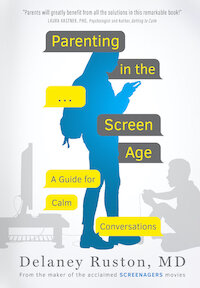
Last week I was talking with a counselor at a high school who told me about how the students immediately go on their cell phones when they leave classrooms and enter the hallways, and that she was “...sure they are all losing their ability to communicate.” When people have said this to me, I think they are often surprised by my response which is:
“I can relate to your concerns—but let’s also think about Aunt Jane or Uncle Joe who didn’t grow up with much screen time but, boy, do they struggle with effective communication.”
However, I don’t mean to say that a preponderance of screen time is not impacting kids’ communication skills—I believe there surely are effects. Sadly, there is practically no published research that compares communication skills of today’s youth to those of youth in the past. I would love to see data for such things as frequency of eye contact, ability to confidently talk to people of all ages, and confidence in expressing uncomfortable thoughts and emotions.
I am a big believer that communication is a teachable skill. We can all learn more productive ways to handle in-person interactions. During my medicine residency, mentors taught me how to navigate a multitude of communication challenges—such as with people from different cultures and end of life discussions. I realized there was an entire science of communication and I was eager to learn more—so after my residency, I went on to do a Fellowship in Medical Ethics focusing specifically on doctor-patient communication.
Let’s use this week’s Tech Talk Tuesday time to discuss communication skills with our children or students. I want to share a communication tool that comes from a field of therapy, called DBT (Dialectical Behavior Therapy), created by Marsha Linehan. It’s called DEAR, and it is great to use when anyone is about to ask for something that they are nervous about.
D = Describe the situation
E = Emotion you are feeling about the issue
A = Ask for what you want
R = Reiterate how it will benefit both of you if this can be worked out
My son, Chase and I talked today about DEAR, and he gave me an example of a friend he wants to try DEAR on this week. The friend is frequently off in the corner on his phone when the two of them are together. This is what Chase plans to do:
D = Describe to his friend that he sees him checking his phone much of the time they are together
E = Because of this Chase feels distant (the emotion) when they hang out
A = Ask him if they could try hanging out just one day with their phones entirely out of view
R = Reiterate that he thinks they would both have a better time together
So for TTT let's talk about communication. How do we improve our face-to-face communication skills? Here are some questions to get the conversation started:
Here is a video from the Screenagers YouTube Channel that talks more about this subject

Last week I was talking with a counselor at a high school who told me about how the students immediately go on their cell phones when they leave classrooms and enter the hallways, and that she was “...sure they are all losing their ability to communicate.” When people have said this to me, I think they are often surprised by my response which is:
“I can relate to your concerns—but let’s also think about Aunt Jane or Uncle Joe who didn’t grow up with much screen time but, boy, do they struggle with effective communication.”
However, I don’t mean to say that a preponderance of screen time is not impacting kids’ communication skills—I believe there surely are effects. Sadly, there is practically no published research that compares communication skills of today’s youth to those of youth in the past. I would love to see data for such things as frequency of eye contact, ability to confidently talk to people of all ages, and confidence in expressing uncomfortable thoughts and emotions.
I am a big believer that communication is a teachable skill. We can all learn more productive ways to handle in-person interactions. During my medicine residency, mentors taught me how to navigate a multitude of communication challenges—such as with people from different cultures and end of life discussions. I realized there was an entire science of communication and I was eager to learn more—so after my residency, I went on to do a Fellowship in Medical Ethics focusing specifically on doctor-patient communication.
Let’s use this week’s Tech Talk Tuesday time to discuss communication skills with our children or students. I want to share a communication tool that comes from a field of therapy, called DBT (Dialectical Behavior Therapy), created by Marsha Linehan. It’s called DEAR, and it is great to use when anyone is about to ask for something that they are nervous about.
D = Describe the situation
E = Emotion you are feeling about the issue
A = Ask for what you want
R = Reiterate how it will benefit both of you if this can be worked out
My son, Chase and I talked today about DEAR, and he gave me an example of a friend he wants to try DEAR on this week. The friend is frequently off in the corner on his phone when the two of them are together. This is what Chase plans to do:
D = Describe to his friend that he sees him checking his phone much of the time they are together
E = Because of this Chase feels distant (the emotion) when they hang out
A = Ask him if they could try hanging out just one day with their phones entirely out of view
R = Reiterate that he thinks they would both have a better time together
So for TTT let's talk about communication. How do we improve our face-to-face communication skills? Here are some questions to get the conversation started:
Here is a video from the Screenagers YouTube Channel that talks more about this subject

Did you know that 45% of girls stop playing sports by age 14 due to low body confidence? That is a shocking and devastating statistic. Dove's Super Bowl ad, in partnership with Nike highlighted this, presenting a critical conversation starter about the intersection of self-esteem, body image, and performance in societal contexts. This 30-second spot was shown to an audience of 123.4 million, as part of Dove’s “The Self-Esteem Project” In a world where what girls see on social media, influencers on YouTube on their favorite shows, and in advertising powerfully shape perceptions and behaviors, this was an important moment. Read more and see the ad in today’s blog.
READ MORE >
For me, Valentine’s Day (which is, by the way, one of my top holidays) is about communicating our love and appreciation for people we care about — not just those we may be romantically involved with. Emojis are all about communicating and we all have different emoji-use styles — from complete nonuse to the most curated and abundant use. What are you? What is your child? And why is it even worth asking?
READ MORE >
As a physician and the creator of the "Screenagers" movies, I've always been fascinated by the intricacies of adolescent decision-making. Through the Screenagers podcast, I've had the opportunity to delve deep into this topic, and in a podcast episode I just released yesterday, I share some of those insights with you. I invite you to listen to the Podcast, but if you prefer to read, click here for a summary of the podcast.
READ MORE >for more like this, DR. DELANEY RUSTON'S NEW BOOK, PARENTING IN THE SCREEN AGE, IS THE DEFINITIVE GUIDE FOR TODAY’S PARENTS. WITH INSIGHTS ON SCREEN TIME FROM RESEARCHERS, INPUT FROM KIDS & TEENS, THIS BOOK IS PACKED WITH SOLUTIONS FOR HOW TO START AND SUSTAIN PRODUCTIVE FAMILY TALKS ABOUT TECHNOLOGY AND IT’S IMPACT ON OUR MENTAL WELLBEING.
